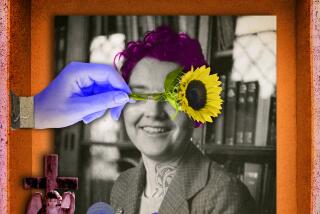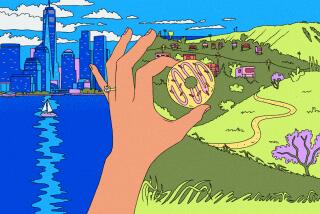PRIVATE FACES, PUBLIC SPACES : A Bus Ride to the Land of Dreams--and Maybe to the Beach, Too
Who has not seen the huge yellow school buses lumbering early in the morning out of narrow city streets toward the sleeping suburbs? Dark, blank faces, row upon row: a crowd, a mass, faces without name, lives beyond expression, carried away in the same unquestioning resignation with which prisoners mount jail buses, soldiers embark.
Any month now, Frisley Juarez, age 13, will start busing to an unknown place in unknown streets, an alien land, the San Fernando Valley--Birmingham High School. His older brother, Kirby, has been there for two years; his parents have never seen it, never been part of its life.
Frisley has hardly been out of his neighborhood at the back of Normandie Avenue. He went to elementary school nearby, to junior high around the corner. Here are a few of the things Frisley has never done: been to the beach (the bus fare is too expensive), seen Disneyland or Griffith Park. He has, however, seen: “Romeo and Juliet,” “Hamlet,” “King Lear,” “Macbeth,” Laurence Olivier’s bleak rage, Ian McLellan’s lean elegance. He has read “Animal Farm,” “Catcher in the Rye,” “The Martian Chronicles,” Dickens and Twain. One teacher’s magic; light across one boy’s soul.
His mother speaks no English; his father’s is halting. But Frisley Mahumar Juarez loves the romance of words. The mind is a safe place, the world is not. He was a year old when his parents got on a bus in Guatemala City. The men who led them to the States dumped their suitcases somewhere in Mexico. Weight was money. The journey took eight days and eight nights. Frisley cannot imagine how his quiet, timid parents found such courage. “I don’t think I like taking risks,” he says, “I’m afraid of doing something bad, of something bad happening to me.”
He hides within; he uses the fact that, in his life, to be Latino is to be invisible. Watch Frisley walking down the road: dark clothes, black shoes, his head hanging, his face heavy and blank, a young man’s mustache barely showing. He holds his hands out of the way. But watch Frisley as he talks when he is with his young brother, Billy, and the father he worries over--the wrenchingly sweet smile, the fine, fine spirit.
He was in a gifted program in junior high school. But he who had mastered algebra at 11 pined for challenge, to read great books, to wrestle with words. He has never talked of this with his parents. His mother is 33, works long hours in a sweatshop and has never missed a day. His father is older, a car mechanic, uncertain, insecure. “When my father gets upset, he gets sick.” His father would like him to be a doctor, an engineer, a scientist.
Frisley never mentions the books he cannot afford, the places he never goes. He has never had the feel of money jingling in his pocket, money of his own. He works during school vacations, only too glad to help. All his dreams at night are of being rich, a house for his parents, a room of his own.
They live now in a small room, crowded with beds and bunks. His parents eat dinner standing in the narrow kitchen; the boys sit on a bed. Frisley does his homework on the corner of a small table, long, careful hours while the clatter and blare of the streets whirls around him. And he loves this room: every nook and cranny filled and tidied, beautiful red fabric scraps sewn together as covers and curtains. And in the kitchen, a music box plays Tchaikovsky, achingly, full of torment and doom in its innocent chimes.
Watch for the yellow buses; they contain jewels.
Ah, the miracle of the grass that grows up through the pavement.
More to Read
Sign up for Essential California
The most important California stories and recommendations in your inbox every morning.
You may occasionally receive promotional content from the Los Angeles Times.










